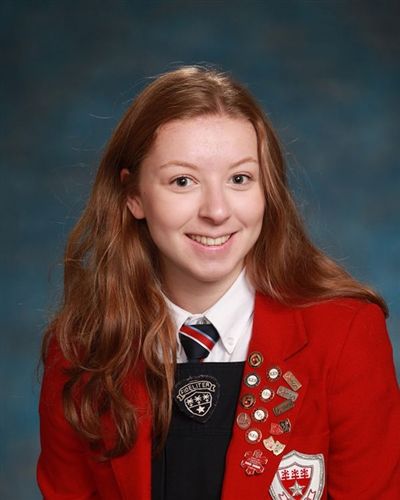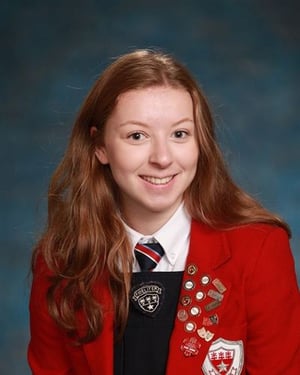Inside King's-Edgehill School

Math Camp 2019
 Math Camp is a week-long camp put on by Dalhousie University’s Department of Mathematics and Statistics and the Canadian Mathematical Society every summer for a select group of 20 students (10 girls and 10 guys) from various schools across Nova Scotia who enjoy mathematics.I was fortunate to attend this year’s camp the summer before my Grade 12 year at King’s Edgehill School. The days consisted of a two and a half hour morning lector session, then another two and a half hour afternoon lector session after lunch, followed by an hour at the Dalplex fitness center and then an extracurricular activity in the evening.
Math Camp is a week-long camp put on by Dalhousie University’s Department of Mathematics and Statistics and the Canadian Mathematical Society every summer for a select group of 20 students (10 girls and 10 guys) from various schools across Nova Scotia who enjoy mathematics.I was fortunate to attend this year’s camp the summer before my Grade 12 year at King’s Edgehill School. The days consisted of a two and a half hour morning lector session, then another two and a half hour afternoon lector session after lunch, followed by an hour at the Dalplex fitness center and then an extracurricular activity in the evening.With regard to the math lectors, there was a wide variety of topics which touched on multiple different types of mathematics. The following is a list of the names of some of the lectors as well as the names of the presenters (A more in-depth description of the each of the lectors will be featured at the end.):
• “Symmetry, Math, and Crystals” by Daniele Turchetti
• “Playing a Rubik’s Cube Like a Piano: A Brief Introduction to Group Theory” by Asmita Sodhi
• “Double or not Double, That is a Question” by Lam Ho
• “Probability for Fun and Profit” by David Wolfe and Matt Lewis
• “Infinite Cardinalities” by Julien Ross
• “Irrational Numbers” by Chelluri Sastri
• “The Game of SET” by Danielle Cox
Some of my favourite lectors were “Double or not Double, That is a Question”, “Probability for Fun and Profit”, and “The Game of SET”. However, I truly enjoyed them all and the presenters were all extremely knowledgeable and fascinating.
Although the focus of the camp was evidently on the math lectors, the extracurricular activities were a wonderful addition to the camp, and a great way to end the days with the other students at the camp. Our activities consisted of movie night, where we watched The Imitation Game, an excellent film set in 1939, where the newly-created British intelligence agency MI6 recruits Cambridge mathematics alumnus Alan Turing (played by Benedict Cumberbatch) to crack Nazi codes, including Enigma which cryptanalysts had thought unbreakable. We also went bowling, explored the Halifax waterfront, visited the Discovery Centre, watched Shakespeare by the Sea, an outdoors theatre company in Halifax, perform The Wizard of Oz, and finally on the last day we had a pizza party.
Overall, I had a wonderful experience at the camp and learned lots about mathematics as well as made great friendships and memories with the other students who I still chat with today. I would highly recommend the camp to other students!
Lector Descriptions
“Symmetry, Math, and Crystals” by Daniele Turchetti
Symmetry is a concept used very often by mathematicians, artists, and scientist alike. It is often associated with ideas of beauty, and harmony, but it is not one that is easy to define. Also known as Group Theory. Seen through examples of how this elegant language can encode patterns in nature (such as those of crystals) and art (such as those in the tiling of the Alhambra).
“Playing a Rubik’s Cube Like a Piano: A Brief Introduction to Group Theory” by Asmita Sodhi
What does a Rubik’s Cube have in common with chords on a piano? Mathematical structure! In pure mathematics, algebra isn’t solving for x like most may be used to; it is the study of algebraic structures and the patterns within them. In the presentation, we looked at one of these structures, called a group, and learned about its properties by playing with shapes and numbers.
“Double or not Double, That is a Question” by Lam Ho
Have you ever thought about whether Double Stuf Oreos have twice the filling as Regular Oreos? How can such a thing be proved? In this lecture, we learned how to address this question statistically.
“Probability for Fun and Profit” by David Wolfe and Matt Lewis
In this lecture, we talked about how probability affects our everyday lives in surprising ways. We investigated how the Inspection Paradox explains why your wait at the bus stop seems longer than it should be, why polls are so often hard to get right, and why countries with lots of immigrants have artificially inflated life expectancies. We also learned how a very simple probability paradox teaches one how to be a successful investor.
“Infinite Cardinalities” by Julien Ross
If A is a collection of forks and B is a collection of knives, it is easy to determine whether we have as many forks as we have knives: we could count the number of forks, then we could count the number of knives, and then we compare these two quantities. This process is not restricted to cutlery, of course. We can use it to compare the size of any to collections A and B. But how should we proceed if A and B are both infinite collections? Do all infinite quantities have the same size? Does it even make sense to try to compare the size of two infinite collections? In this lecture, we considered the notion of size as it applies to infinite collections and explored ways of comparing the size of such collections.
“Irrational Numbers” by Chelluri Sastri
Starting with Natural numbers, we constructed rational numbers, explaining the reasons for doing that. We also introduced the number line and showed that there are points on it that correspond to rational numbers. We then showed that a number is rational if its decimal expansion is either finite or repeating infinitely. We also defined irrational numbers as those that have non-repeating infinite decimal expansions and real numbers as the aggregate of rational and irrational numbers. First establishing the irrationality of the square root of 2, we showed that in fact, the nth root of any positive integer that is not a perfect nth power is irrational. We showed that, given an irrational number, other irrational numbers can be constructed, finally, introducing algebraic and transcendental numbers, we pointed out, without proof, that most real numbers are transcendental.
“The Game of SET” by Danielle Cox
In this lecture, we learned the history of the Game of SET, played the game and then explored some fascinating mathematics related to the playing of the game.







